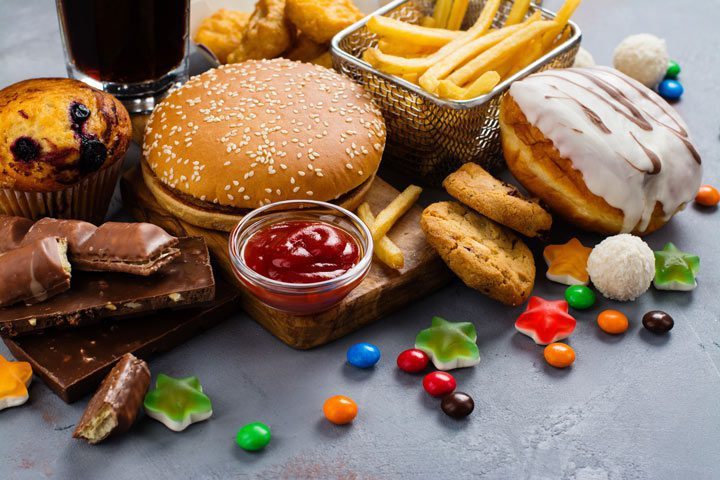
Food addiction is a genuine concern for many people, and like many process addictions, this compulsive condition is representative of more serious issues that need to be addressed.
Highs and Cravings
Individuals who struggle with food addiction often eat to excess and crave foods high in artificial sweeteners, fat, salt, sugar, or a combination of these. They report experiencing a form of euphoria while eating these foods—much like a high caused by alcohol and drugs. This is because highly-palatable foods cause the brain to release feel-good chemicals, such as serotonin and dopamine. Some nutrition scientists state that these foods are often more challenging for our brains and bodies to process effectively, especially when made with unnatural substances, and too many chemicals flood our systems. Cravings begin when receptors in the brain adjust to this rush, requiring someone to eat more for the same effect.
While people with this compulsive eating disorder might be overweight or obese, others have a normal body mass index and still suffer from it. In fact, because we all need food to survive, anyone is at risk for developing food addiction, especially if the behavior is triggered by trauma, grief, stress, or mental health issues, such as anxiety or depression—similar to the root causes of other eating disorders.
For some people, there might also be a genetic predisposition for food addiction. However, environmental risk factors play a much greater role, such as children watching the binge-eating behavior of their parents, or partners who excessively use food as a reward or show of affection. If a person eats to meet an unresolved emotional need or to cope, is anti-social, or is impulsive or seeks greater levels of sensations, plus has genetic or behavioral tendencies, the likelihood for food addiction is much higher.
Food and Symptoms Associated With Food Addiction
Any food and drink consumed in high quantities can be a problem—even healthy choices, such as carrots, star fruit, kombucha, raw tuna, nutmeg, and water, according to Live Science. But foods often associated with compulsive consumption include:
- Candy
- Chips
- Chocolate
- Cookies
- Fries
- Ice cream
- Pasta
- White breads
High concentrations of sugar and salt, plus simple carbohydrates such as white bread, pasta, and peeled potatoes, are foundational reasons for numerous chronic health conditions. These include diabetes, high cholesterol, heart disease, auto-immune disorders, and others. And, as mentioned above, obesity and other weight management issues are primary concerns due to food addiction.
Indicators of a More Serious Problem
It’s one thing to eat a little too much during the holiday season or while on vacation. Food addiction is more than not minding your normal healthy eating plan once in a while. Medical News Today lists these symptoms as indicators of a serious problem:
- Experiencing emotional release through eating
- Not having control over frequency of eating or quantities consumed
- Having episodes of compulsive or binge eating
- Being preoccupied by the thought of getting food and eating it
- Repeated failed attempts to stop the behavior
- Secretive eating or hiding the amount of food consumed
- Allowing the behavior to have a negative effect on socializing, finances, or relationships
- Eating so much that it causes physical discomfort or pain
- Feelings of guilt, shame, or embarrassment
- Choosing extreme methods to reverse the effects of the behavior, such as vomiting, excessive exercise, or restricting meals
This quiz from the Yale Food Addiction Scale helps people understand their current or future risk for this condition.
Treating Food Addiction
Like other addictions, having a compulsive behavioral problem with food is less about chips and candy and more about why someone deals with issues through food. Many process addictions such as gambling, shopping, sex, and gaming manifest as a result of other serious life occurrences. Successful treatment of food addiction often includes the following methods:
- Professional intervention to determine if co-occurring conditions such as substance abuse or mood disorders are present.
- Individual and group therapy to uncover root causes for the behavior and learn better coping skills.
- Evidence-based trauma therapy to heal from past events instead of masking or avoiding them.
- Cognitive behavioral therapy to examine actions or associations related to the behavior and help control compulsive thoughts.
- Nutritional counseling and planning to help detoxify from particular foods and develop a more healthy and progressive relationship with what you eat.
In the first few weeks of treatment, a person might experience physical withdrawal symptoms, such as cravings and headaches. They might also feel lethargic, on edge, and restless.
Once a person stabilizes in treatment, addiction specialists might also recommend specific lifestyle changes to ensure effective recovery. These might include adapting other healthful habits, such as exercise, adequate sleep, learning to cook meals at home that are nutritionally rich and devoid of processed foods, and trying hobbies that increase enjoyment and self-worth.
Cottonwood Tucson Understands Process Addictions
Our team of experts believes facing pain and learning the skills to overcome it offers hope to anyone experiencing addiction of any kind. Some of us have personally dealt with addiction, trauma, substance abuse, depression, codependency, and other issues, so we understand what you or a loved one might be going through now, and we can show you how to move forward. If you have a question about process addictions, behavioral health, and other issues, contact us today.







